The DDL command in SQLcl allows you to get the same information you’d see in an object editor’s SQL panel in SQL Developer.
Like so:
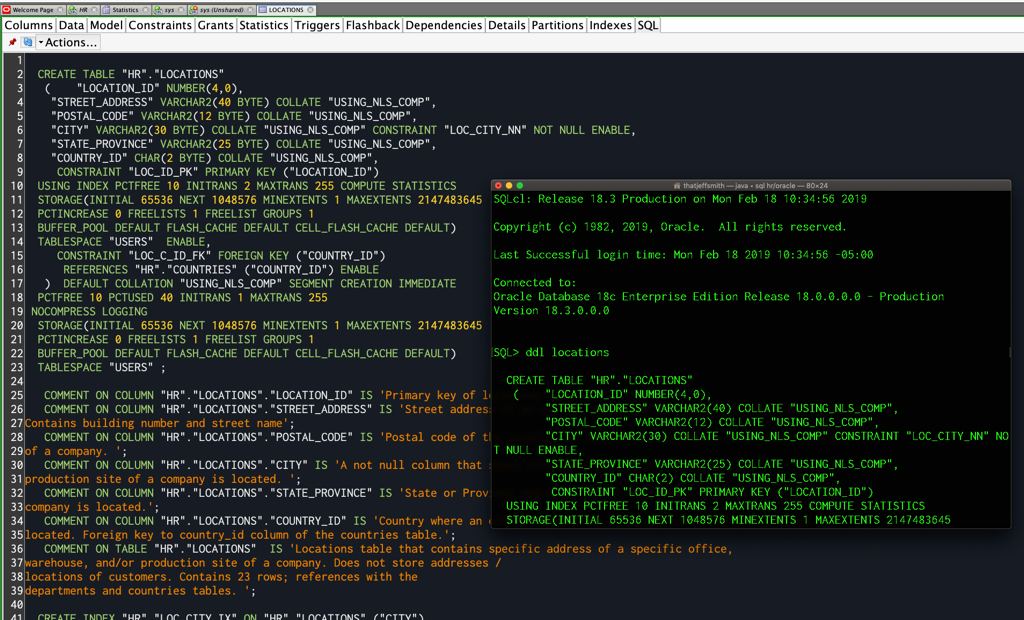
But a user asked me recently about doing this for an actual Oracle USER, say, ‘HR’.
Hi Jeff @thatjeffsmith,
— Balu Reddy (@BaluRed19023071) February 18, 2019
Can we generate user ddl also using sqlcl why I asked is because we mostly use to get request for creating a mirror user.
So let’s make this happen TODAY, versus waiting for a product enhancement update.
Make Your Own USER Command
One of the SQLcl commands is called ‘ALIAS.’ It allows you to take a query or script and map it to a new command in SQLcl. It also allows for positional :binds in your code.
So, I’m going to steal the SQL that SQL Developer uses when generating DDL for a schema, and I’m going to re-purpose it to a new command in SQLcl called ‘USER.’
Getting the SQL We Need
We just do ‘the work’ in SQL Developer, and then observe the ‘Statements’ panel.
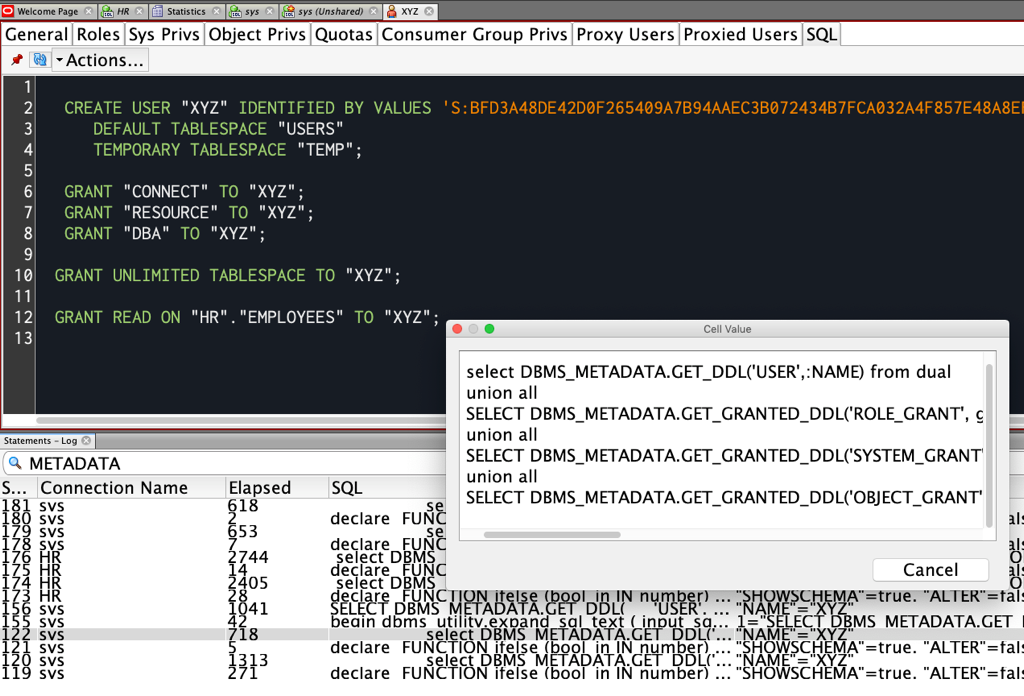
Now that we have our code identified, copy and paste it into SQLcl (although I did format it first in SQL Developer so it’d be easier to read here.
The ALIAS Command
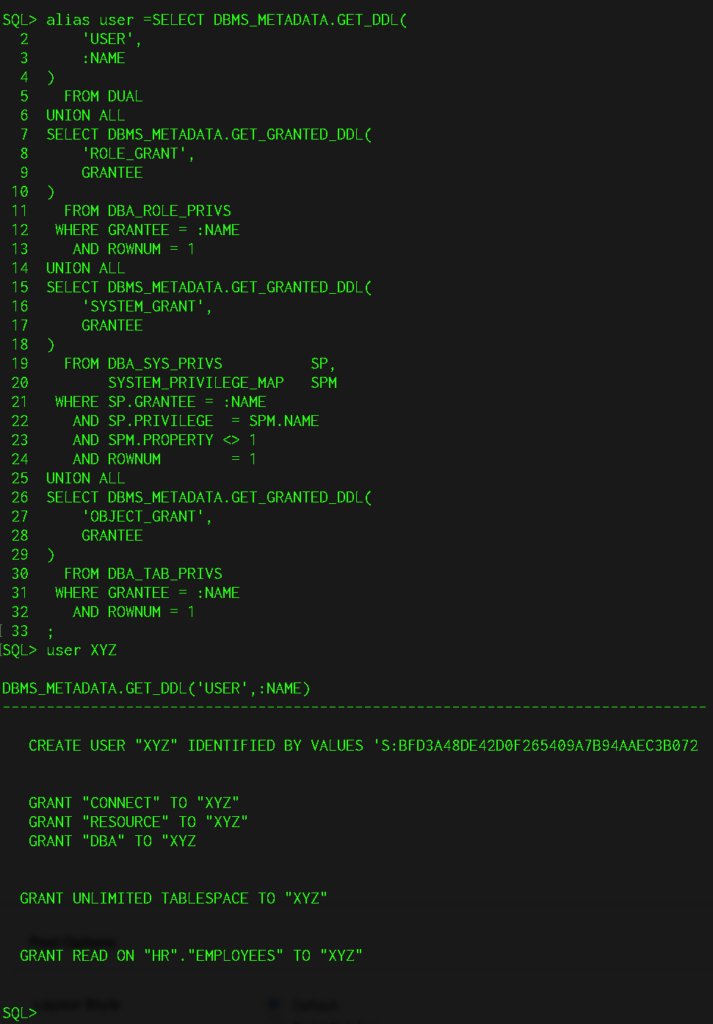
There’s only one :bind in the query – that’s ‘:NAME’ – so when I invoke the command, I only need one parameter – the name of the USER I want the DDL for.
Here’s the SQL you need (tested on an 18c Oracle Database)
SELECT DBMS_METADATA.GET_DDL( 'USER', :NAME ) FROM DUAL UNION ALL SELECT DBMS_METADATA.GET_GRANTED_DDL( 'ROLE_GRANT', GRANTEE ) FROM DBA_ROLE_PRIVS WHERE GRANTEE = :NAME AND ROWNUM = 1 UNION ALL SELECT DBMS_METADATA.GET_GRANTED_DDL( 'SYSTEM_GRANT', GRANTEE ) FROM DBA_SYS_PRIVS SP, SYSTEM_PRIVILEGE_MAP SPM WHERE SP.GRANTEE = :NAME AND SP.PRIVILEGE = SPM.NAME AND SPM.PROPERTY <> 1 AND ROWNUM = 1 UNION ALL SELECT DBMS_METADATA.GET_GRANTED_DDL( 'OBJECT_GRANT', GRANTEE ) FROM DBA_TAB_PRIVS WHERE GRANTEE = :NAME AND ROWNUM = 1
So when you need a command that we haven’t built yet, build it yourself 🙂
But Wait, This Won’t Run – There’s no Semicolons!
Dawn pointed out in the comments, that DBMS_METADATA leaves out statement delimiters by default. This is by design as a program running SQL directly on a driver, say JDBC, doesn’t need to include semicolons.
But, we’re generating code which will ultimately be ran ad-hoc most likely in SQLcl or some other query interface.
To get the semicolons, just put this in your login.sql or run this before running your new USER command:
BEGIN dbms_metadata.set_transform_param( dbms_metadata.session_transform, 'SQLTERMINATOR',TRUE); END; /
And now when we run the command again, we get…
SQL> SET long 1000 SQL> USER HR DBMS_METADATA.GET_DDL('USER',:NAME) -------------------------------------------------------------------------------- CREATE USER "HR" IDENTIFIED BY VALUES 'S:74A7D802F0664676487836016A9F085517CC 153D4DE1384C459CCD17DD75;T:C7067A2E84D0376E29B317DF9CFE73087D379589842FB537C46D7 406C388F735CD6ED4FC83222D9F340DBDA9A3443192C690764BFE4BB46260B9B3B5980F839B7252F 969AA89FB889EBD1115D6A8955D' DEFAULT TABLESPACE "USERS" TEMPORARY TABLESPACE "TEMP"; GRANT "DBA" TO "HR"; GRANT "SELECT_CATALOG_ROLE" TO "HR"; DBMS_METADATA.GET_DDL('USER',:NAME) -------------------------------------------------------------------------------- GRANT "EXECUTE_CATALOG_ROLE" TO "HR"; GRANT "ROLE_TD" TO "HR" WITH ADMIN OPTION; GRANT "ROLE_TD3" TO "HR" WITH ADMIN OPTION;
Notice also I’ve set LONG to a bigger number as this package returns the DDL as a CLOB, and SQLcl will need more characters available to display the entire script.



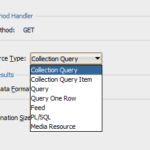
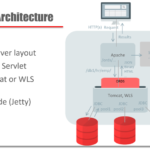

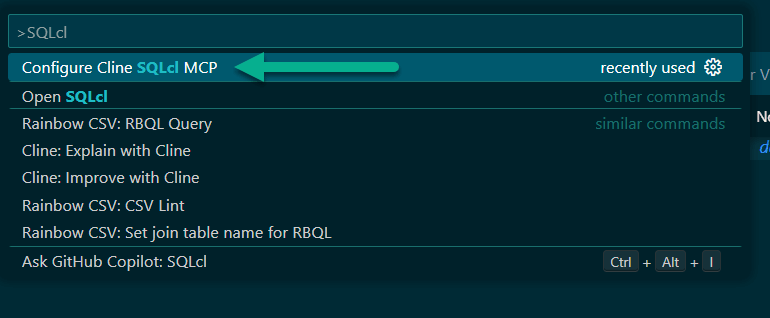

6 Comments
I tried it with
Oracle SQLDeveloper Command-Line (SQLcl) version: 22.2.0.0 build: 22.2.0.173.1733
with no success.
You tried what, exactly? I listed quite a few steps, in that blog post.
But you can already do a ‘create like’ in sql developer for a user.
Just use the DBA view, security, right click the user you want and away you go.
Note, object level grants aren’t replicated unfortunately
But I’m at a cmd prompt, not in a GUI…I want my cake and I want to eat it 🙂
Also, if you want the grants in SQLDev, you have to enable them in preferences under Database, Export.
Now, if only dbms_metadata subprograms could return commands that you can just copy and paste to rerun, instead of manually having to add semi-colons all over the place! Looking at your example, that still doesn’t happen automatically!
Just need to set the transformer
dbms_metadata.set_transform_param(indexTransHandle,
‘SQLTERMINATOR’, TRUE);